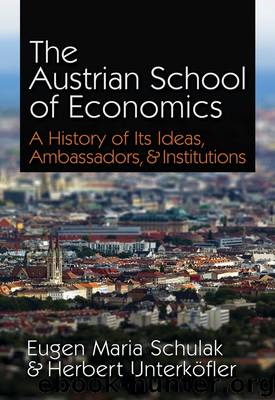The Austrian School of Economics by Eugen Maria Schulak & Herbert Unterköfler

Author:Eugen Maria Schulak & Herbert Unterköfler [Eugen Maria Schulak]
Language: eng
Format: epub
ISBN: 978-1-61016-134-3
Publisher: Ludwig von Mises Institute
Published: 2011-11-06T16:00:00+00:00
___________________
1Regarding the biography see Hülsmann 2007a, Rothbard 1999, and Mises 197S/2009.
2Ed.: The Wiener Prater is a large public park in the second district of Vienna, referred to simply as the “Prater” by locals.
CHAPTER 18
Friedrich August von Hayek: Grand Seigneur on the Fence1
Friedrich August’s great-great-grandfather, Josef Hayek, on account of his commercial success, was knighted by Emperor Josef II a few weeks before the French Revolution in 1789. He had risen to estate administrator and had founded two textile factories near Brünn and Vienna. The family fortune was largely lost during the course of the nineteenth century, but the family in turn produced a high school principal, an ornithologist, a botanist, a chemist, a beetle specialist and three physicians. Friedrich August’s father, who worked as a physician as well, published standard works on Austria’s botanical geography in his free time, which led to his being offered an unsalaried lecture post at the University of Vienna. His mother, Felicitas, whose kinship to the Wittgensteins and whose friendship with the royal-imperial finance minister, Eugen von Böhm-Bawerk, contributed significantly to the social status of the family, raised three more academics. The two youngest sons, Erich and Heinrich, started careers as a chemist and anatomist respectively; but Friedrich August, born on May 8, 1899, would make his family’s name known worldwide (cf. Hennecke 2000, pp. 27–29).
Young Fritz accompanied his father on botanical expeditions into the region surrounding Vienna early on. Here he received his first training in scientific methodology as a photographic assistant. Through his family he became acquainted with the future Nobel Prize winners Erwin Schrödinger (1887–1961), Karl von Frisch (1886–1982), and Konrad Lorenz (1903– 1982), who had been fascinated by geese even as a young child. These men would become his valued colleagues. His parents placed little importance on religious education, but they did accompany him to the Burgtheater, where he became acquainted with the works of the great playwrights.
During Hayek’s middle school years he displayed “the typical signs of a gifted student who is not being sufficiently challenged”: he attracted the teachers’ attention, usually in a negative way, due to his “intelligence, laziness, and lack of concentration and interest.” At the same time he would read Aristotle and socialist pamphlets—especially during religious education, and under his desk at that (ibid., pp. 30–31). After graduating from the Elisabethgymnasium and serving as an officer in World War I, he enrolled at the University of Vienna to study law, but spent most of time concerned with economics, psychology, the philosophy of science, and philosophy. Hayek read works by Menger and Böhm-Bawerk, made initial contact with the Austrian School, and also got to know some members of the Wiener Kreis.2 Insufficient opportunities for the training and employment of psychologists finally made him decide to deepen his knowledge of economics as part of his political science studies under Friedrich von Wieser, who would later be his doctoral advisor. Wieser also supervised his Habilitation in political economy in 1929.
After receiving his law doctorate in 1921, Hayek, along with
Download
This site does not store any files on its server. We only index and link to content provided by other sites. Please contact the content providers to delete copyright contents if any and email us, we'll remove relevant links or contents immediately.
The Brazilian Economy since the Great Financial Crisis of 20072008 by Philip Arestis Carolina Troncoso Baltar & Daniela Magalhães Prates(133690)
International Integration of the Brazilian Economy by Elias C. Grivoyannis(107501)
The Art of Coaching by Elena Aguilar(53161)
Flexible Working by Dale Gemma;(23282)
How to Stop Living Paycheck to Paycheck by Avery Breyer(19684)
The Acquirer's Multiple: How the Billionaire Contrarians of Deep Value Beat the Market by Tobias Carlisle(12305)
Thinking, Fast and Slow by Kahneman Daniel(12217)
The Radium Girls by Kate Moore(12010)
The Art of Thinking Clearly by Rolf Dobelli(10405)
Hit Refresh by Satya Nadella(9115)
The Compound Effect by Darren Hardy(8918)
Tools of Titans by Timothy Ferriss(8357)
Atomic Habits: Tiny Changes, Remarkable Results by James Clear(8315)
Turbulence by E. J. Noyes(8014)
A Court of Wings and Ruin by Sarah J. Maas(7804)
Change Your Questions, Change Your Life by Marilee Adams(7728)
Nudge - Improving Decisions about Health, Wealth, and Happiness by Thaler Sunstein(7687)
How to Be a Bawse: A Guide to Conquering Life by Lilly Singh(7464)
Win Bigly by Scott Adams(7181)
